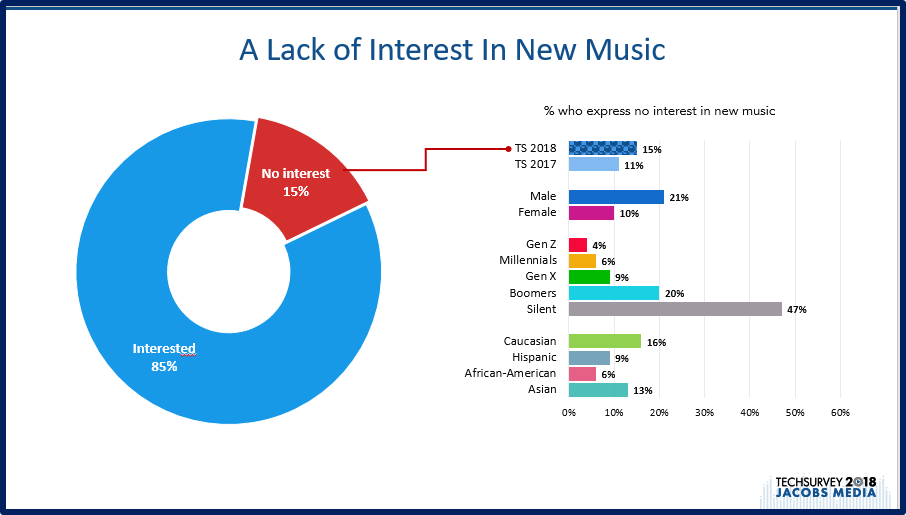
I am often asked about what’s behind the longevity of the Classic Rock format, now celebrating 33 years on the FM band, starting with our first big client, WMMQ in Lansing. The station is still going strong today, despite ownership and competitive changes.
And in the case of so many successful Classic Rock stations in 2018, younger demos are part of the success story. There are “generational formats” – ones that latch onto an age group or lifestyle and ride with them for decades. That’s how we used to think about Classic Rock. Only fans who grew up with Floyd, Clapton, and Queen would be logical candidates to continue enjoying this music as they age.
And then there are “transitional formats” – like Top 40 – that generally appeal to young people who eventually grow out of the format at some point in their 20s or 30s.
But oddly enough, Classic Rock has upended that paradigm, continuing to score well even as its core audience falls off the so-called “demographic cliff” at age 55. As we can see in yet another strong Nielsen PPM monthly, many stations in the format are knocking down robust ratings in key demographics, including Classic Rockers in Philly (Beasley’s WMGK), New York City (iHeart’s Q104.3), Chicago (Hubbard’s WDRV), Detroit (Beasley’s WCSX), Dallas (iHeart’s KZPS), Phoenix (Hubbard’s KSLX), Minneapolis (Cumulus’ KQRS), St. Louis (Hubbard’s KSHE) – to name several.
Younger demographics – those who most certainly did not grow up with the Stones, Zeppelin, AC/DC, or the Eagles – continue to levitate ratings and revenue against all the demographic odds.
Perhaps one of the factors in this generational puzzle is now scientific findings suggesting the peak of new music discovery tends to happen as consumers hit their 20s or early 3os. It’s all downhill from there.
A story last week in Science Alert by Lindsay Dodgson points to a new Deezer study among 1,000 Britons that explains this new music timeline. In fact, this study suggests the falloff point for new music passion occurs around age 24.
Why the dropoff in interest? Respondents point to too much choice, as well as lifestyle issues (jobs, children) that get in the way of their newmusic discovery activity.
Dodgson also references a Spotify study from 2015 showing that teens are immersed in new music and up and coming artists, but by the early 30s, tastes are pretty much set in stone.

But none of this explains why so many consumers listen to music formats that play the same older songs over and over again – yes, like most Classic Rock stations?
The same story talks about a scientific study in a journal called Memory & Recognition pointing to the reality that one of music’s most powerful effects is nostalgia – the ways in which memories are rekiindled by the familiar songs we remember from our formative, youthful years. Most of us vividly remember where we were and what we were doing when that Steely Dan, Journey, or Van Halen song was being played on the radio.
If you’re looking for a chemical explanation for this phenomenon, economist Seth Stephens-Davidowitz says those great songs from our past actually stimulate dopamine, serotonin, and oxytocin – among other legal pleasure compounds. Just hearing them on the radio produces positive reactions in the brain.
Closer to home, this year’s Techsurvey tackled the same topic, asking our gigantic web-based sample of respondents all over North America about their new music interests. Overall, 15% of our 64,000 surveytakers report no interest music discovery.
A deeper dive into this group reveals men and progressiveley older respondentss fall into this group that’s ambivalent about new music, echoing these other studies. But our research suggests an older drop-off point:

If you’re looking for rational reasoning to explain Classic Rock’s evergreen appeal, now you have a little science to explain it. It will amaze and impress clients, sales reps, airstaff, and parents at kids’ sports events – many of whom question why stations rely on the same time-tested music.
Just blame it on the dopamine.
Although I think it’s the Doors and the Doobie Brothers.
Thanks to music maven Alan Cross for the timely heads-up.
- 5 Lessons For Radio From The Apple Watch - May 5, 2025
- DJs And Baristas: Can They Save Their Companies? - May 2, 2025
- Radio’s New Audience Equation: Z Over Y = Trouble - May 1, 2025




Classic Strong takes many forms! And, makes both money and happy listeners.
Spot on, Clark.
When i was a kid, driving around listening to Top 40, II would always wonder why my favorite songs would just disappear from the radio. Then months later my favorites would show up on the “Solid Gold Weekend”.
My teen aged grandsons, seldom listen to the radio, but they really like grandpa’s old rock records. They were listening to Roundabout by Yes the last time they visited, I told them it was one of their mother’s favorite songs when she was a kid. I don’t know if they were impressed or bewildered.
It is amazing how resilient so much Classic Rock from that era has turned out to be. I’d have to believe something as complex as Yes or King Crimson would be a bit strange-sounding to a kid. Thanks for sharing your real-life “reseearch.”
They both really like anything by the Who. Of course they live in the “Teen Age Wasteland” of Santa Cruz, so “who” can blame them.
Our local county fair here in San Diego is in full-swing in the beach town of Del Mar. I was at the fair a couple days ago (where I saw both Kansas and the Village People!) while wearing my Beatle’s “Hard Days Night” T-shirt. NOTHING brings total strangers up to me to talk excitedly like when I’m wearing a Beatles shirt–but what really stunned me was how every age group and ethnicity is represented–Black, White, Hispanic, Asian, from teens (often the MOST enthusiastic) and up!
Maybe the success of these stations is simply proof that the “new music” often being discovered is actually the “old music.”
Dave, good point (and another reason why many radio stations shouldn’t leave their merch strategy on the table). Thanks for the story.